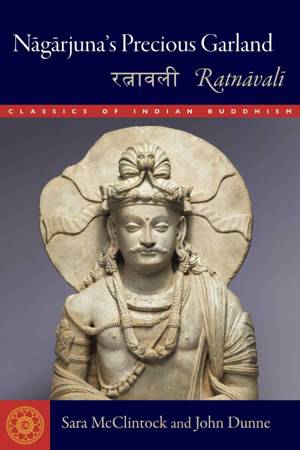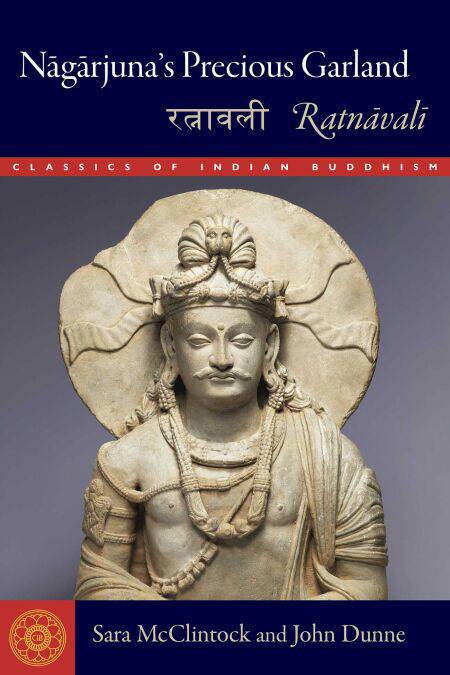
- Retrait gratuit dans votre magasin Club
- 7.000.000 titres dans notre catalogue
- Payer en toute sécurité
- Toujours un magasin près de chez vous
- Retrait gratuit dans votre magasin Club
- 7.000.0000 titres dans notre catalogue
- Payer en toute sécurité
- Toujours un magasin près de chez vous
Description
Discover the eloquence and insight of the philosopher Nagarjuna, held by tradition to be a second Buddha, in this concise instruction for a king that is considered a masterpiece of Buddhist literature.
In this profound work of five hundred verses, we encounter a presentation of Buddhism that integrates both the worldly and the transcendent. The clear and sagacious advice laid out on every page serves as a road map to one’s highest goal—whether that goal is a better life, here called the Dharma of ascendance, or the ultimate one of spiritual freedom, the Dharma of the highest good. The verses, written for an unnamed ruler, touch on questions of statecraft, but their broader themes speak to us today because they tackle the difficulty of integrating one’s spiritual journey with the social and political demands of daily life.
Nagarjuna was an Indian Buddhist teacher, probably of the second century CE, who was renowned for his astute articulation of the philosophy of the Middle Way (Madhyamaka). His thoroughgoing critique of all forms of essentialism became a touchstone for Mahayana Buddhism in India, Tibet, and throughout East Asia, and his importance for the development of the Mahayana tradition can scarcely be exaggerated.
The translators here first rendered Nagarjuna’s letter for the Dalai Lama’s teachings on the work in Los Angeles in 1997. While that commemorative edition was translated from the Tibetan, the present volume prioritizes the surviving Sanskrit verses along with the only known Indian commentary, by the eleventh-century scholar Ajitamitra. This is the first complete translation in English of the Precious Garland that takes the Indian text and commentary as its primary authorities. In addition, the translators provide rigorous working editions of the Sanskrit and Tibetan verses they translate.
This elegant and precise rendering of Nagarjuna’s work is certain to become the touchstone translation of this celebrated Buddhist text.
In this profound work of five hundred verses, we encounter a presentation of Buddhism that integrates both the worldly and the transcendent. The clear and sagacious advice laid out on every page serves as a road map to one’s highest goal—whether that goal is a better life, here called the Dharma of ascendance, or the ultimate one of spiritual freedom, the Dharma of the highest good. The verses, written for an unnamed ruler, touch on questions of statecraft, but their broader themes speak to us today because they tackle the difficulty of integrating one’s spiritual journey with the social and political demands of daily life.
Nagarjuna was an Indian Buddhist teacher, probably of the second century CE, who was renowned for his astute articulation of the philosophy of the Middle Way (Madhyamaka). His thoroughgoing critique of all forms of essentialism became a touchstone for Mahayana Buddhism in India, Tibet, and throughout East Asia, and his importance for the development of the Mahayana tradition can scarcely be exaggerated.
The translators here first rendered Nagarjuna’s letter for the Dalai Lama’s teachings on the work in Los Angeles in 1997. While that commemorative edition was translated from the Tibetan, the present volume prioritizes the surviving Sanskrit verses along with the only known Indian commentary, by the eleventh-century scholar Ajitamitra. This is the first complete translation in English of the Precious Garland that takes the Indian text and commentary as its primary authorities. In addition, the translators provide rigorous working editions of the Sanskrit and Tibetan verses they translate.
This elegant and precise rendering of Nagarjuna’s work is certain to become the touchstone translation of this celebrated Buddhist text.
Spécifications
Parties prenantes
- Auteur(s) :
- Editeur:
Contenu
- Nombre de pages :
- 368
- Langue:
- Anglais
- Collection :
Caractéristiques
- EAN:
- 9781614298687
- Date de parution :
- 04-03-24
- Format:
- Ebook
- Protection digitale:
- Adobe DRM
- Format numérique:
- ePub

Les avis
Nous publions uniquement les avis qui respectent les conditions requises. Consultez nos conditions pour les avis.






